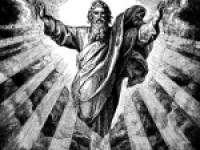Revelation 19:11-16
We all love the end of a story, especially when it says, “…and they lived happily ever after.”
We love it when the villain gets punished, when the lost dog finds his way home, the teacher finally turns her class around, when the underdog team wins the championship or when the dedicated musician finally gets a big break.
Let’s face it we like resolution, solved mysteries, happily ever after. Maybe we like that because that is seldom the way we find this world. We can’t stand it when resolution does not come, primarily because we have lost sight of the fact that Jesus is Lord!
A Dangerous World
In the book of Revelation, The Apostle John is writing to seven churches under the power of Roman. The Romans were very suspicious of new religions. The Jews had won a little freedom in their worship and were tolerated in the Roman world, which was not the case with the Christians. Christians found themselves on the outs with the Romans on a number of points. They refused to be part of the trade guilds because they refused to honor the gods associated with those guilds. They were branded as traitors by the Romans because they refused to burn an offering of incense to the Emperor and make the declaration, “Caesar is Lord.”
When new Christians were baptized they made the confession, “Jesus is Lord,” it put them in conflict with the whole culture of that day.
To remain faithful to Christ they had to be in conflict with every other aspect of life. So, they were persecuted, oppressed, denied rights branded as criminals, traitors and enemies of the state. They became the scapegoats of the whole empire and were killed by the thousands just for the entertainment of the crowds in the Roman Coliseum.
As the Book of Revelation opens John encourages and corrects the churches of the empire toward to ideas faithfulness and hope.
To make the confession, Jesus as Lord in that context was seen as stupid, irrational and dangerous. But, Christians knew something – Jesus was indeed Lord, so how could they say any different. They also had the hope that one day Jesus would come back to set everything straight. Their confession put them at odds with everything in their world, but that world was not the last word.
Revelation
The book of revelation reminds us of a truth we cannot see because we are blinded by our current circumstances. It tells us that in spite of how everything appears Jesus Christ is the true king. “[These verses] describe not what Christ is going to do but what he is: conquering King, righteous Judge, Captain of the armies of heaven.[1]
Look at the way Jesus is described in those verses:
- Faithful and True,
- A Judge and Warrior, leader of the armies of heaven
- His eyes are like a flame of fire – he is able to see into the hearts of all
- On his head are many diadems – he is the absolute ruler of all
- He has a name written that no one knows but himself – he is under the control of no one
- He is called is The Word of God and by his word he conquerors
- The agent of the wrath of God the Almighty
- King of kings and Lord of lords.
Jesus is the One to whom all people owe allegiance, the one before whom every knee will bow, the One who has the final word.
Our World
For us in the western world the danger is almost nonexistence. Instead of lions we have the ACLU, instead of burning incense we are asked to go with the flow – and many do!
The fact that Jesus is Lord calls forth two very important traits in those of us who claim to be his followers.
Faithfulness
If Jesus really is the King of Kings and Lord of Lords, what other response could possibly be appropriate?
For faithfulness to be real it must be unconditional. When we chose to follow Christ we didn’t know what that choice would involve. We made the choice because in light of what we knew about Jesus there was no alternative. No one else can forgive sin; no one else can give new life; no one else can save. What life circumstances could possibly change that truth?
The truth that Jesus is Lord is the same in good times and bad, in prosperity and poverty, in sickness and health, in peace and in peril, when prayer is answered the way I want or not. And our only response is faithfulness – what else is there? Here was Paul’s experience:
[2 Co 4:8-11 ESV ] We are afflicted in every way, but not crushed; perplexed, but not driven to despair; persecuted, but not forsaken; struck down, but not destroyed; always carrying in the body the death of Jesus, so that the life of Jesus may also be manifested in our bodies. For we who live are always being given over to death for Jesus’ sake, so that the life of Jesus also may be manifested in our mortal flesh.
And yet he remained faithful!
The circumstances we face in this world, whether personally or with our families and friends, don’t change the fact that Jesus is King of Kings and Lord of Lords. We remain faithful because there is no other option.
Does God do miracles, healings? Yes, they are wonderful gifts of his grace. But if God never did another thing for us, if all he did was forgive us and grant us new life here and in heaven…it would be enough for us to be faithful for all eternity!
What does faithfulness mean?
It means we maintain the relationship through prayer, we continue to obey, to worship, to learn and grow and gather with God’s people.
Since the fact of who Jesus is doesn’t change with the circumstances, neither does my faithfulness. Do the circumstances hurt, make me sad, cause me to doubt? Yes. But our doubt is expressed in relationship not out of it.
Many people only come to Jesus because of the personal benefits they will receive from him. If Jesus does not fulfill all of their expectations, they get upset and stop honoring God. If that is the case, who is really Lord?
Hope
If Jesus is King of Kings and Lord of Lords that means my circumstance doesn’t have the last word – Jesus does!! And because of that I have hope!
Paul kept preaching and traveling because of this hope. In spite of all that happened to him. Listen to what he says:
[Ro 8:35-39 ESV ] Who shall separate us from the love of Christ? Shall tribulation, or distress, or persecution, or famine, or nakedness, or danger, or sword? As it is written, “For your sake we are being killed all the day long; we are regarded as sheep to be slaughtered.” No, in all these things we are more than conquerors through him who loved us. For I am sure that neither death nor life, nor angels nor rulers, nor things present nor things to come, nor powers, nor height nor depth, nor anything else in all creation, will be able to separate us from the love of God in Christ Jesus our Lord.
We can continue to pray, obey, worship, toil, grow, witness and even die because no matter what, Jesus has the last word! Do you believe that? That is what hope is all about!
An Invasion
When we understand that Jesus is King of Kings and Lord of Lords, that truth has a profound effect on our everyday lives. In reality it is not something that will happen in the future, it is something that is a fact now and because of that it affects our lives now.
That fact invades the present and affects the way I treat others, my decisions, my entertainment choices, the way I do my job, the way I dress, my dating life, if I am single, my married life, the way I view the government, the way I spend my money, the way I see the world and even the way I see my current circumstances.
The declaration, “Jesus is Lord,” is not about emotion, but the alignment of my life with the truth of who Jesus is. It is not about adopting a new philosophy of life, or merely reframing the world or my circumstances in the world. It is about a commitment to the One who not only will rule the nations with a rod of iron, but who allowed iron nails to pierce his hands and feet to show you how much he loves you. Isn’t it time you acknowledged Jesus is Lord? If not now when?
[1]Michael Wilcock,
The Message of Revelation : I Saw Heaven Opened, Reprint. Originally published: I saw heaven opened. Downers Grove, Ill. : InterVarsity Press, 1975., The Bible speaks today, 183 (Leicester, England; Downers Grove, Ill., U.S.A.: Inter-Varsity Press, 1986], c1975).


